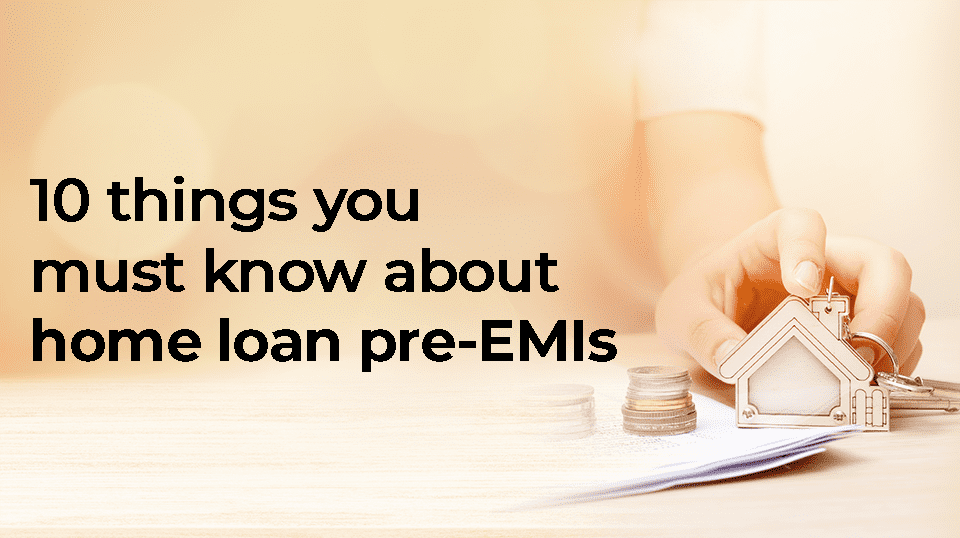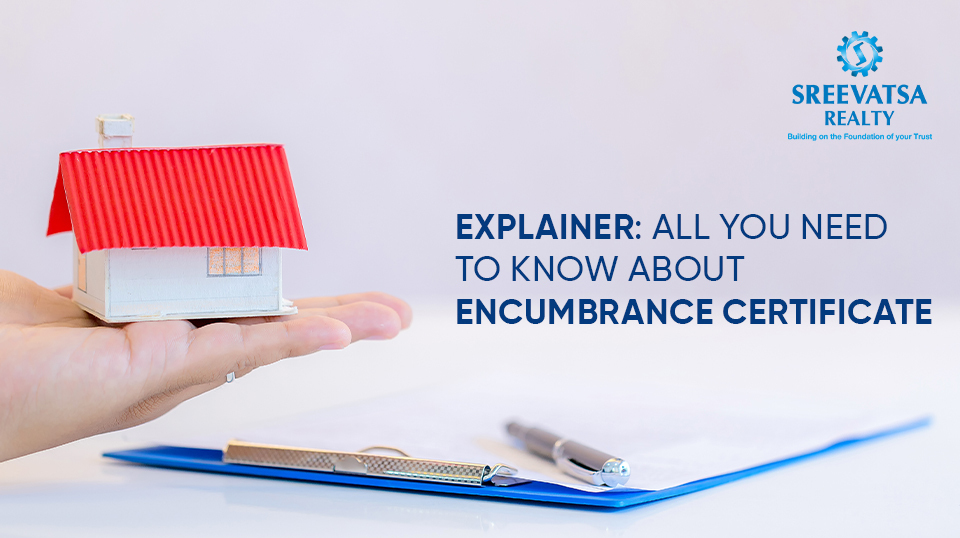Author: venpep_dev
10 things you must know about home loan pre-EMIs
Pre-EMI refers to a payment scheme in which a borrower starts paying the interest component of a loan amount disbursed by a lender before the commencement of the actual Equated Monthly Installments (EMIs). This payment is usually applicable for home loans or property loans, where the loan amount is disbursed in parts or stages instead of the entire amount at once.
In such cases, the borrower is required to pay only the interest component of the loan amount disbursed until the loan tenure commences. This is known as pre-EMI. The borrower continues to pay the pre-EMI until the full loan amount is disbursed, after which the actual EMI payment starts.
Here are 10 things you must know about home loan pre-EMIs:
Definition
Pre-EMI is a type of loan repayment scheme in which the borrower pays only the interest component of the loan amount disbursed until the loan tenure commences.
Purpose
Pre-EMI payments are made by borrowers who have availed of a partial disbursement of their loan amount and want to start repaying the interest component of the disbursed loan amount before the actual EMI payments start.
Calculation
Pre-EMIs are calculated on a daily basis on the amount disbursed by the lender and the applicable interest rate. The borrower is required to pay the pre-EMI amount every month until the actual EMI payments start.
Amount
The amount of pre-EMI payments depends on the loan amount disbursed, interest rate, and the time gap between the disbursal of the loan amount and the commencement of the EMI payments.
Duration
The duration of pre-EMI payments depends on the time gap between the disbursal of the loan amount and the commencement of the EMI payments.
Interest
The interest component of the pre-EMI payments is usually lower than the EMI payments, as the pre-EMI payments are made only on the disbursed loan amount.
Tax Benefit
Pre-EMI payments do not offer any tax benefit to the borrower. The tax benefit can be availed of only when the actual EMI payments start.
Impact on Credit Score
Pre-EMI payments do not have any impact on the borrower’s credit score as long as the payments are made on time.
Prepayment
Pre-EMI payments cannot be considered as prepayment of the loan amount, as they do not reduce the principal amount of the loan.
Pre-EMI vs Full EMI
It is advisable to opt for full EMI payments if the borrower has the capacity to repay the entire loan amount. Pre-EMI payments can increase the overall cost of the loan as the borrower has to pay the interest component of the disbursed loan amount for a longer duration.
Adhil Shetty, CEO, Bankbazaar.com, says, “You can choose between a pre-EMI and a full EMI option when buying an under-construction property. In a pre-EMI plan, you need to pay only the interest on the disbursed amount till you get possession of the property or at the end of the moratorium period (usually around 2-3 years), whichever is earlier. On the other hand, in a full EMI option, you have to start paying the EMI immediately, regardless of the bank disbursing the loan partially or completely. Under the full EMI option, the EMI is calculated on the entire loan amount and not on the amount disbursed by the bank until that time.”
“Apart from the above-mentioned EMI options, banks may also offer additional variations in home loan products; as such, you’ll be well-advised to inquire about different types of EMI options available with your preferred bank before finalising your lending decision,” adds Shetty.
If you are opting for a Pre-EMI scheme, there are certain things that you should check before signing up for it. Here are a few important things to keep in mind:
Interest Rate
Check the interest rate charged on the pre-EMI payments. Ensure that it is reasonable and within your budget.
Payment Frequency
Verify the frequency of pre-EMI payments. Ensure that the payment schedule is convenient for you and aligns with your income cycle.
Disbursement Schedule
Understand the disbursement schedule of the loan amount. Ensure that the lender disburses the loan amount as per the agreed schedule, and there are no delays or discrepancies.
Check if the lender charges any prepayment penalties for making prepayments or repaying the loan before the actual EMI payments start. Opt for a scheme that offers flexible prepayment options. If you still have any doubts, you must feel free to clarify the same from the lender before you sign a loan agreement.
FinancialExpress – Manage Your Money
Living on rent or buying a house? Do’s and Don’ts of investing in residential real estate: Manage Your Money
“There are various merits of owning one’s own home. First, it brings in a systematic discipline towards investing over a period of time. And if invested smartly, the right kind of project also acts as an inflation hedge. So I strongly believe that owning an asset is something one should start early in their career,” he said.
While that’s true for most Indians, according to Magicbricks’ India Rental Housing Update, total rental housing demand (searches) in 13 Indian cities jumped by about 15.8 per cent quarter on quarter (QoQ) and 6.7 per cent year on year (YoY), while the cumulative rental housing supply (listings) increased 30.7 per cent QoQ and 101.5 per cent YoY across the cities mapped, during January-March 2022. “Buying a house is a long commitment and renting gives you a cushion till the time you reach a stage where you can enter into that commitment,” said Amarendra Sahu, Co-founder & CEO, NestAway Technologies Pvt Ltd.
Read More: Rental housing demand in Indian cities grew 15.8% QoQ in Q1, 2022: Report
What’s the right time and right way to invest in residential real estate?
Investing in residential real estate vs renting a home has been an ongoing debate for years now, but a do(s) and don’t(s) list of real estate investment seems like the right way to go about it.
Right time of investment
When one is looking to buy a home, they need to look at their ‘disposable income so that it doesn’t become a stress’ for the buyers. Amarendra Sahu added, “Buying a home is an anchor experience. I would say pace yourself; when you are going to buy a house and ensure that you have enough liquidity.” However, as Ramesh Ranganathan asserted, today’s generation has more disposable income and they are being able to invest in real estate much earlier than what the earlier generations did.
Right kind of investment
“From a financial planning point of view, we recommend that EMIs should be limited to 30 per cent of your take-home income. If you are going for 50 per cent or 60 per cent, your other important financial goals get impacted. Also, go for 30-40 per cent down payment,” said Mrin Agarwal, Founder Director, Finsafe India Pvt Ltd. Besides streamlining this, one needs to look at the location of the property, the accessibility of the property to basic public conveniences, the builder one is buying into, how well the society is managed, if its a heterogeneous society, etc. while making the final investment decision. Also, post the pandemic, buyers have started looking at bigger spaces and also green open spaces around the properties. “The value of space is truly being appreciated now and also, offering the urban forest experience is the effort that is genuinely being made by the developer communities today,” said Ramesh Ranganathan.
Right way of investing
Once you are clear about the kind of investment you want to make, where you want to live, etc., a major tick mark that one needs to look at is the due diligence documentation. “I do not agree with the mindset wherein people feel that it is safe to invest in a property once the bank has already sanctioned the loan on it. There are various other factors to be considered while buying a home,” said Mrin Agarwal. Further, it is also very important to have insurance aligned with your home loan, in case one is going for a loan. “Indians are mostly un-insured and they look at buying insurance as an added expense, especially when they are buying it for loan purposes,” she added.
Right expectations from the investment
Once you have invested in a property, one needs to set the right kind of returns expectations from the same. “Do not expect 25 per cent kind of returns in residential real estate because that’s not happening, given the rental yields and capital appreciation,” said Mrin Agarwal. Adding to the same, Ramesh Ranganathan maintained that if one is looking at investing in residential real estate for rental income, it’s wiser to invest in commercial real estate instead.
Explainer: All You Need To Know About Encumbrance Certificate
Explainer: All You Need To Know About Encumbrance Certificate
If you are planning to buy a house property, you must have come across the ‘Encumbrance Certificate (EC)’. While preparing for the big purchase by bringing together all required documents, make sure you don’t miss out on an Encumbrance Certificate of the specific property.
What is an Encumbrance Certificate?
An encumbrance refers to any charge created on any asset, more often used in the context of real estate. An Encumbrance Certificate or EC is a certificate of assurance that the property in question is free from any legal or monetary liability such as a mortgage or an uncleared loan.
It is of capital importance that a home-buyer obtains an EC not only to secure his legal title over the property but also to be eligible to obtain loans from most banks and financial institutions for or against the property.
There are two types of ECs. They are:
- Form 15
- Form 16
The sub-registrar’s office issues an EC on Form 15 if a property has any encumbrances during the period for which the applicant has sought a certificate. While a nil-encumbrance certificate is issued on Form 16 by the same office if a property has not registered any encumbrances during the period for which the applicant has sought a certificate.
What is a Nil Encumbrance Certificate?
When you apply for an EC, you will be asked to specify the period for which you need the information
If there are no charges placed on the property during the requested period, a “Nil Encumbrance Certificate” will be issued. This means that no lender has placed a lien on the property during that period. The application fee to get an EC differs from state to state. It depends on the location of the property and the state government that governs it.
How to Apply for an EC Online
The steps to apply for an EC differs from one state to another. Some States allow users to apply for an EC online. If you cannot apply for an EC online in your State, you must visit the respective sub-registrar’s office.
Below is the procedure to apply for an EC online:
- Visit the respective State’s official land registration website and select the option to apply for an EC.
- Enter all the required fields on the application for EC window, then click save/update.
- Enter the search period for which you require the EC and then click on ‘Calculate Fee’.
- Upon paying the required application fee is paid and is filed, you’ll be directed to the ‘Acknowledgment’ window. Click ‘View Acknowledgement’ and you’ll be able to take a print of the acknowledgement.
- An inspection will be carried out by an inspector from the land records department and check for all information of the said property for a period.
- Post the completion of the inspection, an EC will be issued will all transactions occurred during the specified period. If there were no transaction during the period, then a nil EC will be issued.
Which States Issue Online ECs?
ECs are primarily granted physically throughout India, with the exception of a few states. Andhra Pradesh, Odisha, Kerala, Puducherry, Tamil Nadu, and Telangana are among the states that provide ECs online.
How to Apply for EC Offline
- Visit the respective sub-registrar’s office (the jurisdiction depends on the location of the property).
- Submit the duly filled Form 22.
- You will be required to enter details such as the names of the seller and buyer, property details, the type of document you are requesting for (in this case, EC), etc.
- Pay the required fee at the counter.
- Once your application is successfully submitted, you will get a reference/acknowledgement number. You can use this number to track the status of the application online.
How to Track EC Status
The steps to track the status of your EC application differs from one website to another. Most of the government websites that allow you to apply for an EC online will also let you track the status of the application.
Most official websites of states allow users to check the status online. The steps are as follows:
- Choose “EC Status” under the “Encumbrance Certificate” option available under the “Certificate” menu.
- Enter the transaction ID provided to you when you submitted the application, enter the captcha, and click on “Check Status”.
- The certificate will be displayed on the screen and you will be able to download it in PDF format.
How Long Will It Take to Get an EC?
As mentioned earlier, the process to obtain an EC differs from one place to another. If you apply for an EC in person at a Sub-Registrar’s Office, you will get the certificate within 15 to 30 days. However, if you apply for an EC online, you will get it faster. Online applications usually take 2 to 3 working days to be processed.
How to Download EC for Your Property
As mentioned earlier, if the respective State Government website allows you to track the status of your EC application online, you will be able to download the file once it is generated.
Documents Required to Get an EC
Some of the documents you would need while applying for an EC are:
- Property details and its title deed details.
- The property sale deed/gift deed/partition deed/release deed if a deed has been executed previously.
- The deed number upon registration containing the date and book number along with the signature of the applicant.
- Property registration document.
- Address proof of the applicant.
Please visit the nearest sub-registrar’s office to know more about the EC in your town/city.
Tax How To Save Tax On Gains From Property Sales
Tax How To Save Tax On Gains From Property Sales
If you are planning to sell a property in the near future then you should be aware of the rules on capital gains tax on property. If a property is sold within two years (24 months) of buying it, any profit from the transaction is treated as a short-term capital gain. This amount is added to the annual income of the property owner for that financial year and is taxed as per his/her income tax slab.
However, if you sell a property after holding it for more than two years, then the gain from that transaction is considered as long term capital gain (LTCG) and it is taxed at 20% after indexation (factoring in inflation). Another thing that needs to be mentioned here is that if you sell your house within five years of the end of the financial year in which it was purchased, the tax deduction claimed for the principal repayment, stamp duty and registration under Section 80C are reversed and the amount becomes taxable in the year of sale. Only the deduction claimed on home loan interest payment under Section 24B is left untouched.
So if you have bought a house by taking a home loan and have claimed the benefits under Section 80C, it is advisable to hold that property for at least five years. If you have not claimed the benefit of Section 80C then you should hold the property for at least two years.
It is worth mentioning here is that one can also get exemption from LTCG tax payment on sale of a property. If you use the entire gain from the property sale to buy another house within two years or construct a house within three years then you can get exemption from LTCG tax payment. You can also get exemption from LTCG tax if you have bought a property one year before selling the first one.
As per the provisions of Section 54, the amount of capital gains is required to be invested in the purchase or construction of “one residential property” for availing the capital gains exemption benefit. However, where the amount of capital gain does not exceed Rs 2 crore, the taxpayer may, at his option, purchase or construct two residential houses in India.
If you are not interested in buying any other property then you have another option to get exemption from LTCG tax by investing that money in capital gains tax exemption bonds, which are also known as 54EC bonds. These bonds can only be issued by specified government organisations such as REC Ltd (formerly Rural Electrification Corporation), Power Finance Corporation Ltd (PFC), National Highways Authority of India (NHAI) and Indian Railways Finance Corporation Ltd (IRFC). Recently, REC, a navratna enterprise of the government, launched REC Capital Gains Tax Exemption Bonds-Series-XVI. Investment in these bonds allows exemption from LTCG tax payment under Section 54EC of the Income Tax Act.
However, to save tax on LTCG, only the gain part needs to be invested in Capital Gain Bonds. For example, if a house property bought for Rs 20 lakh 10 years back is sold for Rs 50 lakh and the indexed cost is Rs 30 lakh, to save the tax on LTCG of Rs 20 lakh, only Rs 20 lakh should be invested in Capital Gain Bonds. To qualify for the tax exemption, the capital gains have to be invested within six months of the transfer of the asset. The quantum of capital gains invested in these bonds would be exempt from LTCG tax, subject to an upper cap of Rs 50 lakh on the investment amount irrespective of the financial year.
The face value of each Section 54EC bond is Rs 10,000 and a minimum investment of two bonds valuing Rs 20,000 need to be made. You can invest a maximum of Rs 50 lakh in 54EC bonds in a financial year. However, in case of jointly-held assets like real estate, each owner has a separate limit of up to Rs 50 lakh for investing in these bonds.
In simple words, if you and your spouse sell a house and made a long-term capital gain of, say, Rs 1 crore that was held jointly by the two of you, then each of you can invest Rs 50 lakh in these bonds and claim a capital gains exemption up to that amount.
Lock-in, Interest Rate and Ratings
These bonds come with a lock-in period of five years from the date of allotment and are non-transferable. You cannot even sell these bonds on stock exchanges, because they aren’t listed. Premature redemption is not permitted under any circumstances. However, in case of death of the investor, if there is a joint holder, the bonds can be transferred to the second or third holder. In the absence of joint holders, bonds can be transferred in the name of the nominee.
Since these bonds are meant for a specific purpose (reinvesting capital gains), they are automatically redeemed after their tenure of five years. You don’t even need to surrender your bond certificate. Interest or redemption proceeds are automatically credited in the registered bank account of the investor
All 54EC bonds carry the highest rating, a AAA rating. Given that these bonds are backed by the government, there are almost no risks of defaults. For instance: REC (formerly Rural Electrification Corporation) has been assigned the highest credit rating for long-term borrowing by domestic credit agencies India Ratings, CRISIL, ICRA and CARE. On an international basis, REC has been given long-term borrowing ratings from Fitch and Moody’s that are on a par with sovereign ratings for India. CRISIL has assigned a CRISIL AAA/Stable (pronounced as CRISIL triple A rating with stable outlook) rating to the REC capital gains bonds. Instruments with this rating are considered to have the highest degree of safety regarding timely servicing of financial obligations. REC bonds offer an interest rate of 5% per annum, payable annually, on 30th June each year, until the date of redemption. It may be noted that the interest earned on these bonds is taxable but no TDS is deducted on interest.
The amount of capital gains can be kept in the Capital Gain Accounts in accordance with the Capital Gain Accounts Scheme, 1988 (CGAS), if the re-investment in the house property (under section 54) or in capital bonds (section 54EC) is not made till the date of filing the tax return. Also, if the taxpayer has already invested some of the portion of the proceeds/gains in the specified asset, he would be only required to transfer the balance portion in the CGAS in order to claim tax exemption on the entire amount.
So which option is more beneficial?
It depends on various factors such as whether the taxpayer wants to invest in new residential property or wants liquidity in the medium term (the term of bonds issued under section 54EC on or after 1 April 2018, is 5 years) and also other aspects such as appreciation in the value of the new residential property or the interest rates on bonds, need to be factored.
Capital Gains Account scheme would suit those who wish to purchase or construct another housing property with the capital gains realised from the transfer, within the specified period.Capital Gains Bonds would suit those who do not wish to use the capital gains realised from the transfer for purchasing housing property or other long term capital assets.
Reference:https://advisor.moneylife.in/blog/tax/article/how-to-save-tax-on-gains-from-property-sales/4056.html
Real Estate Remains Preferred Asset Class For Investors
REAL ESTATE REMAINS PREFERRED ASSET CLASS FOR INVESTORS
The real estate consumer remains positive with regard the economic scenario and income stability for the coming six months; according to ‘Concerned yet positive – The Indian Real Estate Consumer (April – May 2020)’ a report jointly released by Housing.com and National Real Estate Development Council (NAREDCO). Real estate (35%) is still perceived as the preferred mode of investment, followed by gold (28%); Fixed Deposits (22%), Stocks (16%); and homebuyers are likely to slowly return to the market in the coming six months.
Price-points of residential realty have remained muted for the past few years, but are still a key deterrent, with the perception of being still unaffordable. This was the response from nearly half of the potential homebuyers surveyed, who are currently staying in rented accommodation.
Going forward, NAREDCO believes, real estate will be ‘positive’ for both end-users and investors in the post-COVID-19 world. Those living in rental homes have realized the importance of being in their own homes while NRIs facing challenging times in their present domiciles are looking at creating a safe haven ‘back home’ in India. Demand for additional space for home offices is on the rise, with need for more efficient layouts. The importance of common amenities, business centers and more open spaces will be an inherent part of the new demand criteria in the post COVID-19 world.
Should You Invest In Real Estate Now
SHOULD YOU INVEST IN REAL ESTATE NOW
The current market identifies the sector to be a secured form of investment. Ravi Kant, Founder & Director, Elegance Enterprises, Real Estate Consultants
This question is hovering over the minds of several people who want to make the investment now but are skeptical. This fact maybe true but given the current conditions, real estate investment on a long-term does have a silver lining as it is still considered one of the safest and secured forms of investments. The growth in the equity markets across the globe has favoured several investors as it guarantees short-term gains. In addition, most people have never considered buying property due to the higher rates of interest on home loans as it was a fairly cheaper option to rent. What we see now is a change in the mindset as many believe that ownerships provide an unmatched level of security. The economy is in a volatile and unpredictable condition and can affect your investments, unlike real estate which does not react in the same way. With the country’s GDP facing a sharp downward slide and the economic stability losing the grip, investment in Real Estate seems to be favorable and profitable in this pandemonium that life appears to be in. Most importantly, unlike paper money, real estate is an asset that one can possess a tangible value and this further encourages its reliability and return on investment. The link between the GDP growth and demand for real estate adds to the potential for capital appreciation and significant benefits to diversify such as the development of Residential, Commercial and Industrial spaces. As GDP growth drives the increase of real estate prices, it is considered a hedge against inflation, since the value of homes and rental properties typically increase during times of inflation. Also, with only a few new launches of Real Estate Projects happening now, we expect the same for the rest of the year. Because of few new project launches, the unsold inventory will pick up momentum and in the mid to long term the prices will either come back to normal or appreciate in some markets. Therefore real estate becomes a secure investment.
Things to consider before investing
Potential investors and home buyers need to analyze and understand why it is important to purchase property now? The answers to these questions can raise a couple factors – Are they looking for financial security or just to upgrade their current housing. For some, it would be an alternate option to the stock markets because of the slump in the economy caused by the pandemic. The other factors to consider is the financial position of individuals and what is required to buy property such as processing loans, month-on-month EMIs, insurances as well as property tax is something that one needs to bear without facing any strain on life savings. Also with the crisis, several people are on the brink of losing their jobs. It would be critical for such decisions to be made if they are from a two-income family.

Who is going to invest now?
At this time, there isn’t going to be a large demograph pumping in money into this sector but the category of buyers looking at a potential investment is going to be consistent. Reports have shown that buyers have not stopped but slowed down. However, recent analysis have shown that major cities like Bangalore have seen a surge in onsite visits and quick decision making caused by the price brackets falling in favour of investors.
Many potential buyers have been in a ‘Wait and See’ posture even before the pandemic and would see the current time as a perfect opportunity to make their investment. With several offers & interest on Bank loans being slashed which is also at a 15 year low, many investors will come forward.
The price of the rupee is another factor that needs to be taken into account as several NRIs living abroad will also keep a watchful eye and make their investments now as the Rupee is depreciated against the dollar making their investments more financially applicable. The same goes for mutual fund investors who will not see strong return from the stock market in a while. Therefore, it will result in shift of interest towards real estate investments.
Why It’s Absolutely Okay To Buy A Home As An Investment?
WHY IT’S ABSOLUTELY OKAY TO BUY A HOME AS AN INVESTMENT?
In the list of secure investments, investing in a residential property is a prominent one. Indeed, residential properties leverage more demand as it comes with multiple options nowadays. Owning a home not only gives a shelter but also a sense of accomplishment to cherish life under one’s own roof. On the other hand, if you plan to rent out or sell a residential property, you will get an appreciated income for sure. Take a look at this blog to know why buying a home may be the best investment in your life.
Investment in modern home: What does it really bring for you?
Solid investment for life: Owning a home with strategic investment reaps lifetime benefits for you and your family. As time flies, the value of home gets potential appreciation based on the conditions of the real estate market.


A secured future: Settle when you find something that makes you feel happy and comfortable in your life. This is because having own house relieves the stress and ensures a hassle-free experience.
Instant source of income with ROI: Simply, you can rent / lease out your property, earn money and reinvest in a property.


Pride of ownership: The common dream of every human is to pursue a degree, earn a good income, get married, buy a home and settle in life. Obviously, purchasing a new home gives the buyer a sense of pride throughout life.
Assured stability in life: People who have a home on their own can enjoy the stability in life since they live there for an extended period of time without bothering others.


Chance to live a flexible lifestyle: Whether you are single or married with / without kids, you may like to explore different lifestyle at different times. It is impossible to make such major lifestyle changes when you live in a rental house as there would be so many restrictions. So, owning a home in a desired location lets you live your dream life with your loved ones.
How To Choose A Home For Investment? When you start to look for the best home for you, make sure that the neighbourhood is surrounded by a safe community, has impressive amenities, plans for development and is in proximity to everything, as it will enhance the value of appreciation over time.

The Bottom Line Hope now you have understood how an investment in house upgrades your lifestyle while uplifting the wealth over time. According to real estate statistics, it is expected that the value of the residential property will increase in the forthcoming years.
Do you want a house for living or investment? Sreevatsa Real Estates Pvt. Ltd. presents the best investment residential properties in the Coimbatore city that meets your dream life. Invest smart and live smarter!Will Tax Benefits On Home Loan Be Helpful For Buying Your Dream Home?
WILL TAX BENEFITS ON HOME LOAN BE HELPFUL FOR BUYING YOUR DREAM HOME?
In today’s real estate market, banks have started playing a crucial role in laying out loans to property buyers. Generally, every individual has the dream of owning a home to kick start a modern lifestyle or earn a steady income from it. However, not all investors can readily invest in the properties they want. In such a circumstance, investors can choose the right home loan which offers plenty of benefits provided by standard banks. Go through this blog to know more about tax benefits on a home loan that is applicable in our country.
Tax benefits on home loan: What does it really mean?
A home loan is one of the prominent tax-saving instruments that includes both the principal and interest amount repayments. To avoid financial chaos while investing in a property, the government announces various tax benefits under the Income Tax Act of 1961. Homebuyers can avail tax benefits under Income Tax section 80C and section 24B. Even if you are capable of owning a home with your savings, it is still better to avail a home loan, mainly to save on taxes.

Tax deduction on principal repayment: Under the Income Tax Section 80C, the maximum amount that can be claimed per financial year is up to Rs.1.5 lakh on the principal repayment. Know that you can avail this tax deduction only after the construction of the building is completed.


Tax deduction on home loan for homes under construction: If you are planning to make an investment in an ‘under-construction’ property by taking a home loan, you can avail deduction under the Income Tax Act. A homebuyer can have the deduction on interest from the year of owning the home or after the construction is completed.
Tax deduction for stamp duty & registration charges: Apart from deduction in principal repayment, you can also avail deduction for stamp duty and registration charges under section 80C. Note that this tax benefit can be claimed only when the expenses are made


Tax deduction on processing fee: Did you know you can have a tax deduction on the processing fee of a home loan? Yes, under the Income Tax Act – Section 2(28a), the deduction on interest payable for the home loan obtained includes processing fee covered as a service fee.
Tax deduction for first time homebuyers: If you are a first-time homebuyer, you have added tax benefit on claiming home loan. Most banks offer a specific deduction on the home loan every year until the tenure gets over.

We hope you have a clear idea about the tax benefits on the home loan that you can reap while buying a home. According to real estate market, 2020 looks like the right year for homebuyers to invest in residential properties with affordable property prices, more tax benefits, low-interest rates on home loan and best EMI offers. Why miss out this favourable opportunity? Make a smart investment in the residential apartments offered by Sreevatsa Real Estate Pvt. Ltd, Coimbatore to receive the fortune for life.

















